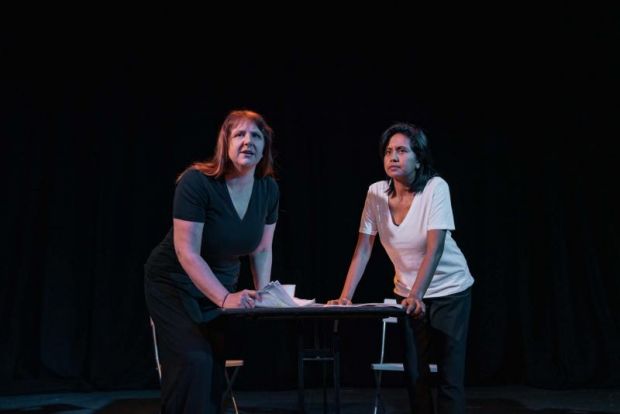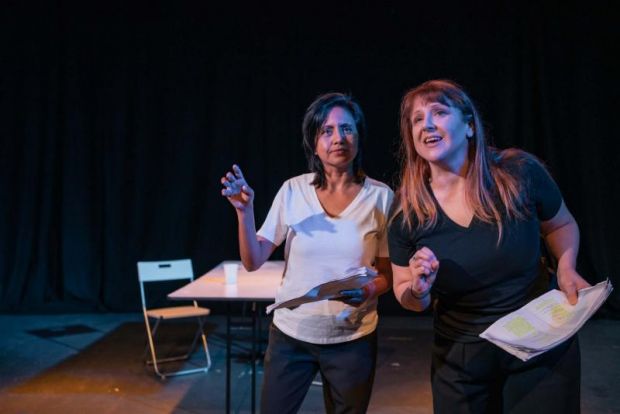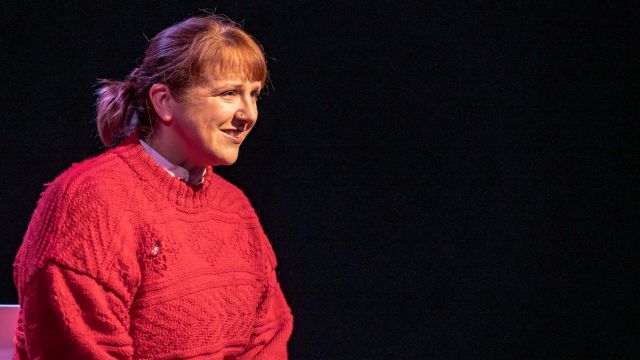Heather
Spoiler alert: this review contains spoilers. But since the play is a speculative, provocative play of ideas - described by the playwright as a ‘thought experiment’ - and not a play of character or emotions, that doesn’t matter too much.
On a stage bare but for two chairs, book editor Harry (Michelle Perera) contacts first time children’s book author Heather (Kristina Benton) who is somewhere in the country. Harry’s publishing house is very interested in developing and publishing Heather’s fantasy novel, Greta and the Pen of the Necromancer. Heather is, of course, humbly grateful and over the moon. Harry will edit… There can be no eye contact as the scene proceeds, but a relationship - of sorts - develops. Heather, however, shyly, apologetically refuses any possible face-to-face meeting. She’s pregnant, then she’s ill - with cancer…

As the novel and its sequel become phenomena (think Harry Potter) take off and sell and sell, Heather turns down promos, live interviews and launches… But… but… the public is dying to meet her. Harry is very frustrated but has to accept it…
Both actors give subtle, nicely contrasting performances. Michelle Perera, in stylish black, plays the sophisticated Harry with just the right touch: a mix of cajoling, flattery, frustration - and discomfort as her author begins to sign herself with an intimate ‘H’ and adds kisses to her emails. Kristina Benton, meanwhile, gives us a nice contrast: an apparently naïve, nervous, soft-spoken, and ever apologetic woman in a red jumper with a hole in it.
But that is only Act I. A relationship by correspondence between a worldly urban woman and reclusive genius has been set up - along with our expectations of what will happen next - and then Eccleshare pulls the rug from under us. After a blackout and a quick costume change, now there’s a table and two chairs, and we’re in a gaol where editor Harry (who is now played by Kristina Benton) confronts ‘Heather’ (now played by Michelle Perera) - real name ‘Tariq’ - who is incarcerated for an horrific crime.

Note: in Ecceleshare’s original text, ‘Harry’ is male in Act I which might make the character/gender switch here less of a bump - and less of stretch for Perera. I’m not entirely clear what director Gavin Roach intended here, but with a play intended to make us think, does the gender switch make us think too much?
In any case, Harry is appalled. First, because of being deceived, second, at Heather’s crime, and third - most important - how revelation of the ‘real’ Heather, a rapist and murderer, will affect sales of the third book in the Greta trilogy. ‘Heather’/Tariq is unfazed: people will want to know how the story turns out.
The game or the challenge with which Eccleshare presents us is the question of what matters more: the story or the person who created the story? If the author is a monster, how much of a monster is in the story? And how should we feel about it? Of course, we could make a very long list of morally blemished, unpalatable, dishonest, exploitative, anti-Semitic, misogynist and just plain nasty artists who have given us treasured works of art.

So, to Act III, in which two new characters - and played as totally new characters by Benton and Perera - two screenwriters, are adapting the Greta books into a giant, blockbuster, CGI extravaganza movie.
So, is this cynicism about the movie business, or an assertion of the primacy of story? Is Heather/Tariq right? Do people want to know how the story turns out no matter who wrote it? In any case, the screenwriters have no qualms; they go at their task with enthusiasm and make an amazing, shattering climax for the movie - in which, significantly enough, the eponymous Greta is reconciled with her major antagonist, Sceros the Witch… And the two actors, trailing the previous characters they’ve played in Act I and II, link hands, making mysteriously the first moment of emotion in this play and one that is curiously moving.

It’s fantasy, it’s the reconciliation of irreconcilable opposites, but it’s healing, it’s what we want. Eccleshare’s play deals with abstractions, but it’s made very entertaining here by its reversals, its humour, and the subtle performances of Perera and Benton.
Michael Brindley
Photographer: Cameron Grant
Subscribe to our E-Newsletter, buy our latest print edition or find a Performing Arts book at Book Nook.

